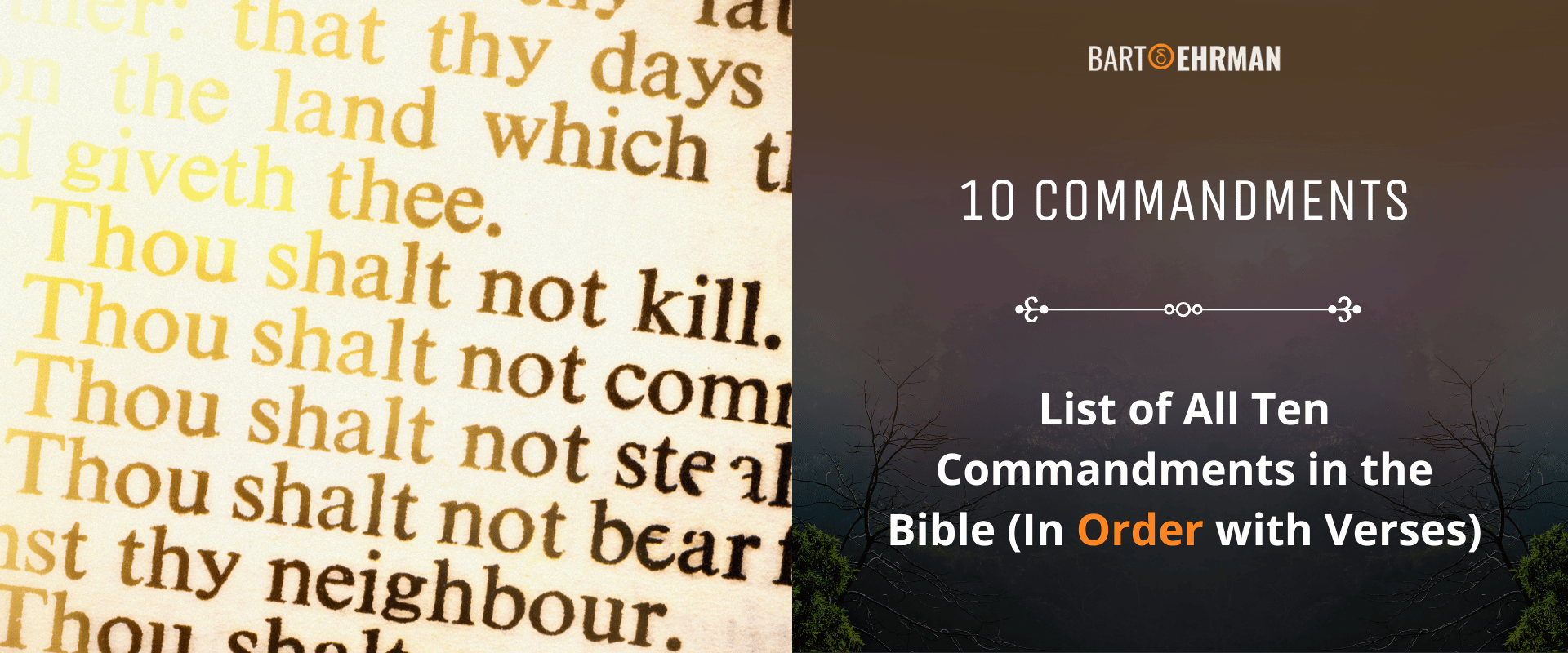10 Commandments: List of All Ten Commandments in the Bible (In Order with Verses)

Written by Marko Marina, Ph.D.
Author | Historian | BE Contributor
Verified! See our guidelines
Verified! See our editorial guidelines
Date written: June 19th, 2024
Disclaimer: The views and opinions expressed in this article belong to the author and do not necessarily match my own. - Dr. Bart D. Ehrman
Whenever the 10 Commandments are mentioned, I immediately think of Charlton Heston’s iconic portrayal of Moses in the classic film "The Ten Commandments" Even though some of my friends find the movie too long, it remains one of the most iconic religious films. Above all, the movie vividly demonstrates the profound influence Judaism and Christianity have had on our culture.
In this article, we’ll explore the historical and cultural significance of the 10 Commandments. Our journey will take us through the origins and context of these ancient laws, exploring their place in the Bible and their role in shaping moral and ethical standards in various religious traditions.
Skip to Section:
We’ll begin with a historical overview, outlining where the 10 Commandments are found in the Bible and discussing their significance within the Jewish covenant with God. This section will also touch on the historical context of their writing, including when Exodus and Deuteronomy were likely composed.
Following this, we’ll present the 10 Commandments in order as they appear in different biblical versions, starting with the longer (original) form as found in Exodus and Deuteronomy, but also including the New Revised Standard Version (NRSV) and the King James Version (KJV).
By the end of this article, you’ll have a comprehensive understanding of the 10 Commandments, not just as religious texts, but as foundational elements that have influenced laws, ethics, and societal norms across various cultures throughout history.
However, before we begin, I have to ask you something! Are you interested in diving deeper into the mysteries of Moses and the Exodus? Join Dr. Bart D. Ehrman in his online course, “Finding Moses - What Scholars Know About The Exodus and The Jewish Law”, and explore whether Moses was a historical figure or a legendary creation. Discover the evidence behind these timeless questions—fact or fiction? Sign up now!

The 10 Commandments in the Bible: Historical Context
The 10 Commandments, also known as the Decalogue (which is, by the way, a more suitable term), have long held an elevated status in Judaism and Christianity.
These commandments of God are found in two main and slightly different versions: the first in Exodus 20:2-17, and the second in Deuteronomy 5:6-21. So, there are two different sets of verses where the 10 commandments are found. Additionally, there is a so-called “Ritual Decalogue” in Exodus 34 which is substantially different.
While we’ll analyze those differences shortly, it's essential first to look at some basic historical context to better understand the 10 Commandments in the Bible.
To grasp their initial meaning, we must journey back to the ancient world and explore the Jewish tradition regarding their relationship and covenant with God. In the Hebrew Bible, a covenant is fundamentally a contract - a legal agreement between parties.
The Hebrew term for "covenant-making" is "c'rat berit," which literally means "to cut a covenant," akin to the English idiom "to cut a deal." In essence, the covenant is viewed primarily as a legal document.
In his "Essays on Old Testament History and Religion," Albrecht Alt argued that there were two forms of law in ancient times: conditional and apodictic law. The former is casuistic, characterized by an "if/then" pattern, similar to the Code of Hammurabi. It specifies that if a person does "X," then "Y" will be the consequence, often including detailed sub-cases and qualifications.
In contrast, absolute or apodictic law is an unconditional statement of a prohibition or command, such as "You shall not murder."
As shown in the excellent book "Ancient Near Eastern Text Related to the Old Testament”, the apodictic law as a form isn't unknown in other ancient Near Eastern cultures (e.g., in the Neo-Babylonian laws), but it seems to be most characteristic of Israel. In other words: There is much more of it in our collections of laws in the Hebrew Bible than elsewhere.
However, its directives are couched in the masculine singular. So, it seems to be addressing Israelite males as the legal subjects in the community - an aspect that shouldn't surprise us considering that the societies in the ancient world were, above all, patriarchal.
In any case, these commandments set forth some of God's most basic and unconditional covenant demands. It’s worth noting that the division into ten is somewhat idealized rather than precise, as there are about 13 separate statements in what we today call the 10 Commandments.
Furthermore, these commandments are numbered differently by Jews and Christians, and even within the Christian community, different denominations have varied numbering systems—as we’ll see later in this article.
10 Commandments: The Date of Composition
Regarding their composition date, we encounter a significant clash between traditional religious interpretations and modern scholarly views. Traditionally, it’s believed that God gave the 10 Commandments from Mount Sinai, amidst smoke, earthquakes, and trumpet blasts, to emphasize their importance.
Moses recorded God's words in Exodus 20 and recounted the event in Deuteronomy 5. This view assumes that Moses authored the Pentateuch (the first five books of the Hebrew Bible), which includes Exodus and Deuteronomy.
However, critical scholars, first led by Julius Welhausen, have challenged these claims and proposed that four different sources (the Yahwist, the Elohist, the Deuteronomist, and the Priestly source) contributed to the Pentateuch’s creation.
Additionally, recent scholarship has cast even greater doubt on the quest for the Pentateuch's authors. In "The Introduction to the Pentateuch”, R. Norman Whybray asserts: “There is at the present moment no consensus whatever about when, why, how, and through whom the Pentateuch reached its present form, and opinions about the dates of composition of its various parts differ by more than five hundred years.”
Regarding the date of the 10 Commandments' composition specifically, no secure answers exist. One intriguing hypothesis, favored by some scholars, suggests they were composed several hundred years after Moses allegedly lived.
In his excellent study "Etched in Stone: The Emergence of the Decalogue”, David H. Aaron notes: "The Decalogue is a late literary creation, written by a group of postexilic authors (i.e., writers working not before the middle of the sixth century B.C.E. and perhaps as late as the fifth century B.C.E.). The Decalogue passages are based upon earlier attempts to create a covenant scene that would serve to unite the Israelite people at a time of political and social discord."
By understanding this historical and cultural context, we can better appreciate the profound significance of the 10 Commandments in the Bible. Additionally, this sets the stage for a closer look at the 10 commandments in order.
The 10 Commandments in the Bible: Text and Versions
We'll start by examining the two versions of the 10 commandments as they appear in the Hebrew Bible, using the New Revised Standard Version (NRSV) translation. The first comes from Exodus 20:2-17, and the second from Deuteronomy 5:6-21.
A List of the 10 Commandments in the NRSV (Exodus 20:2-17)
According to Jewish tradition, Moses repeated the 10 commandments after 40 years in the desert.
More precisely, he gathered the people of Israel in Moab and gave them a farewell speech. One of the first things Moses did was to repeat the 10 Commandments - but with a few small differences. Let’s take a closer look at them!
10 Commandments in Order in the NRSV (Deuteronomy 5:6-21)
From the comparative perspective, the biggest difference between these two versions (Exodus and Deuteronomy) relates to the explanation of the reason behind the weekly day of rest. Perhaps, a table would make a comparison easier. Let’s take a look!
The Sabbath Commandment in Exodus | The Sabbath Commandment in Deuteronomy |
|---|---|
Remember the sabbath day, and keep it holy. Six days you shall labor and do all your work. But the seventh day is a sabbath to the Lord your God; you shall not do any work—you, your son or your daughter, your male or female slave, your livestock, or the alien resident in your towns. For in six days, the Lord made heaven and earth, the sea, and all that is in them, but rested the seventh day; therefore the Lord blessed the sabbath day and consecrated it. | Observe the sabbath day and keep it holy, as the Lord your God commanded you. Six days you shall labor and do all your work. But the seventh day is a sabbath to the Lord your God; you shall not do any work - you, your son or your daughter, your male or female slave, your ox or your donkey, or any of your livestock, or the resident alien in your towns, so that your male and female slave may rest as well as you. Remember that you were a slave in the land of Egypt, and the Lord your God brought you out from there with a mighty hand and an outstretched arm; therefore the Lord your God commanded you to keep the sabbath day. |
How should we understand these differences? As it turns out, these two versions of the 10 Commandments provide distinct reasons for observing the weekly Sabbath. In Exodus, the Sabbath is a recognition of God as the Creator: God created the world in six days and rested on the seventh, so those who worship Him should follow this pattern.
In contrast, Deuteronomy emphasizes the liberation from slavery in Egypt: just as God gave the Israelites rest from their bondage, they must also rest and allow rest for all who work for them. This shift highlights a moral imperative to emulate God's mercy and care for those who labor.
Essentially, these differences are the consequence of the unique social, and cultural concerns of each book. As Robert Goldenberg notes in The Origins of Judaism: “Their combination once again presents a mixture of themes drawn from the contemplation of nature and from the study of the nation’s history. The widespread appearance of such mixtures is a distinguishing characteristic of Biblical literature.”
Having outlined the two versions as they appear in the NRSV translation and explained their main differences, we’ll now provide the 10 commandments list from Exodus as it appears in the King James Bible (KJV).
A List of the 10 Commandments in the KJV (Exodus 20:2-17)
The King James Bible is one of the most influential and widely read translations of the Bible in the English-speaking world. Commissioned in 1604 by King James I of England and first published in 1611, it’s known for its prose and literary complexity.
After presenting the list of the 10 commandments in order as they appear in the KJV, we’ll look at minor but interesting differences in numbering between two important Christian denominations.
10 Commandments in order: Catholic and Lutheran Numbering
The Catholic Church is the biggest Christian denomination in the world. It was the major force throughout the history of the Western world - especially during the Middle Ages when the majority of educated people came from the Catholic clergy and the Church was in charge of education.
Lutherans, on the other hand, are followers of Martin Luther - a 16th-century German monk who initiated the Protestant Reformation by challenging the practices (e.g. sacramental system) and doctrines (e.g. Pope’s authority) of the Catholic Church. Luther’s public ministry sparked a movement that led to the formation of Lutheranism.
To make it easier, we’ve decided to present the divisions of the 10 commandments side-by-side in the short form. Let’s take a look!
10 Commandments in the Catholic Tradition | 10 Commandments in the Lutheran Tradition |
|---|---|
1. I am the Lord your God. You shall not have strange gods before me. | 1. You shall have no other gods. |
2. You shall not take the name of the Lord your God in vain. | 2. You shall not misuse the name of the Lord your God. |
3. Remember to keep holy the Lord’s day. | 3. Remember the Sabbath day by keeping it holy. |
4. Honor your father and mother. | 4. Honor your father and your mother. |
5. You shall not kill. | 5. You shall not murder. |
6. You shall not commit adultery. | 6. You shall not commit adultery. |
7. You shall not steal. | 7. You shall not steal. |
8. You shall not bear false witness against your neighbor. | 8. You shall not give false testimony against your neighbor. |
9. You shall not covet your neighbor’s wife. | 9. You shall not covet your neighbor’s house. |
10. You shall not covet your neighbor’s goods. | 10. You shall not cover your neighbor’s wife. |
In the Catholic tradition, the 10 Commandments are derived from the Bible but follow the Augustinian division. Lutherans, on the other hand, follow the division established by Martin Luther reversing the ninth and tenth commandments thus following closer to the order in Exodus 20.
Having explored the historical context, different versions, and numberings of the 10 commandments, we’ll now turn to a brief analysis of these profound legal provisions that shaped the Western world in many ways.

10 Commandments in the Bible: A Closer Look
The first statements (one through four) focus on Israel's relationship with God. These commandments require Israel to be exclusively faithful to God, avoid bowing down to any manmade image, and refrain from misusing God's name (see below).
Furthermore, Israel is to honor God's Sabbath day and respect parental authority, which can be seen as an extension of God's authority. The remaining commandments address Israel's interactions with others, prohibiting murder, adultery, robbery, false testimony, and covetousness. Let's take a closer look at some of the 10 commandments.
The first commandment ("I am the Lord your God, who brought you out of the land of Egypt...") is crucial because none of the other commandments make sense without it. This commandment asserts that God is the source of these directives and emphasizes that God delivered the Jewish people from slavery.
Therefore, Jews have an obligation to God - an obligation to live by the following nine commandments. According to some scholars, this commandment represents the beginnings of “ethical monotheism”, meaning that the ONE God (monotheism) is the source of ethics and morality.
The second commandment (“You shall not make for yourself an idol...") has an interesting aspect. When God says: “For I, the Lord your God, am a jealous God”, the term “jealous” (קַנָּא) comes from the context of human relationships. It’s the word one would use to describe a jealous lover – an image used throughout the Old Testament to describe God’s relationship with Israel (e.g. Deuteronomy 4:24).
The third commandment is perhaps the most misunderstood due to mistranslation. It explicitly states that God will not forgive anyone who violates it (Exodus 20:6-7).
The commandment says, "You shall not make wrongful use of the name of the Lord your God," but it’s often interpreted as forbidding the casual use of God's name. Even the standard Bible in my language (Croatian) translates the third commandment as “Do not take God’s name in vain”.
However, this interpretation implies that while God might forgive violations of other commandments (e.g., dishonoring parents or stealing), He would never forgive someone for saying His name in vain. The issue, as noted, lies in the translation.
The Hebrew original says "Do not carry." It literally reads, "Do not carry the name of the Lord your God in vain." In his book Jewish Literacy, Joseph Telushkin explains: “The Hebrew, Lo tissa, literally means ‘You shall not carry (God’s name in vain)”; in other words, don’t use God as your justification for selfish causes.”
As our final example, the commandment "You shall not bear false witness against your neighbor” addresses the importance of honesty and integrity within the community. This commandment prohibits lying or giving false testimony, which could, of course, harm others and disrupt social harmony.
Summing up Conclusion
In examining the 10 Commandments in the Bible, we see profound cultural artifacts that have shaped moral and ethical standards across millennia. The commandments serve as cornerstones of ethical monotheism thus emphasizing the Israelites' exclusive relationship with God and outlining fundamental principles for social conduct.
The differences in the Sabbath commandment between Exodus and Deuteronomy highlight the varied theological and historical contexts of these books.
The distinctions in the Catholic and Lutheran numbering of the commandments further illustrate how religious traditions interpret and emphasize different aspects of these texts to align with their doctrinal teachings.
Finally, understanding the 10 Commandments within their historical and cultural frameworks enriches our appreciation of their significance. By exploring their origins, versions, and interpretations, we gain insight into their profound impact on religious, ethical, and legal systems throughout history.

